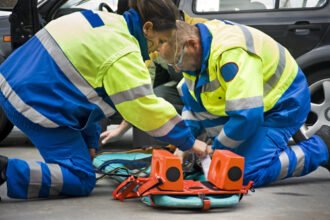We recently attended a screening of the documentary “Escape Fire: The Fight to Rescue American Healthcare”. The 2012 film shines a light on major issues with the US healthcare system, and positions that the only way to fix it is to build an “escape fire.” The literal definition of escape fire is a fire intentionally set to provide shelter from a larger uncontrolled blaze. Figuratively, it is an improvised, effective solution to a problem that can’t be solved by traditional methods.
The film makes a strong argument that US healthcare is beyond traditional methods of repair. Some of the damning evidence of this comes in stories of unsustainable or questionable practices:
- The woman who by her mid-30s had 57 stents in her heart
- The soldier on a bagful of painkillers
- The mid-40s man whose only healthcare is the emergency room after he suffers another heart attack
On the macro level the statistics are worse:
- The US spends almost as much on pharmaceuticals as the rest of the world combined. (Is there any correlation between this and the fact that the US is one of only two countries where drug companies can market directly to consumers?)
- 65% of Americans are overweight
- 75% of health costs are spent on preventable diseases
The film makes a very strong case that the solutions will not be found in the traditional models where the incentives are currently not aligned with keeping people healthy, and where doctors are surprised that patients react well when they are listened to. Solutions come in preventative healthcare measures, team based medicine, and alternative therapies. Again the film does a great job of showing surprising solutions to the problems presented in the first half.
- The woman with the stents will have them forever, but she now works with a healthcare team from Cleveland Clinic who monitor her whole health to prevent future episodes. One way they do this is that they are paid on salary not per procedure so incentives are aligned with what’s best for the patient.
- The soldier with the bag full of drugs is taught meditation and receives acupuncture. He goes home with only these tools to manage post traumatic stress and pain and says he’s a changed man.
- One of the most surprising solutions came from Safeway. Since in the US employers share in much of the burden in rising healthcare costs, it’s in their best interest to try to lower them. The CEO of Safeway realized this a number of years ago and the transformations in employee wellness and Safeway’s health insurance costs are tremendous.
Overall the film was thought-provoking with some incredibly powerful personal stories that represented the larger issues. Our only criticism would be that it failed to even mention models of care in other countries. Yes, it was about the problems in the US, and yes there are some large problems but there are interesting models worldwide that could also serve as potential lessons for how to evolve healthcare. If you are interested in healthcare disruption, though, we would recommend seeing this documentary and exploring some of the resources on the Escape Fire website.
If you like this post, please read other posts in the series on the Person-Centered HealthCare main page. And if you have a story to tell that may be a fit with our series, please comment below or email me at joan@socialmediatoday.com







